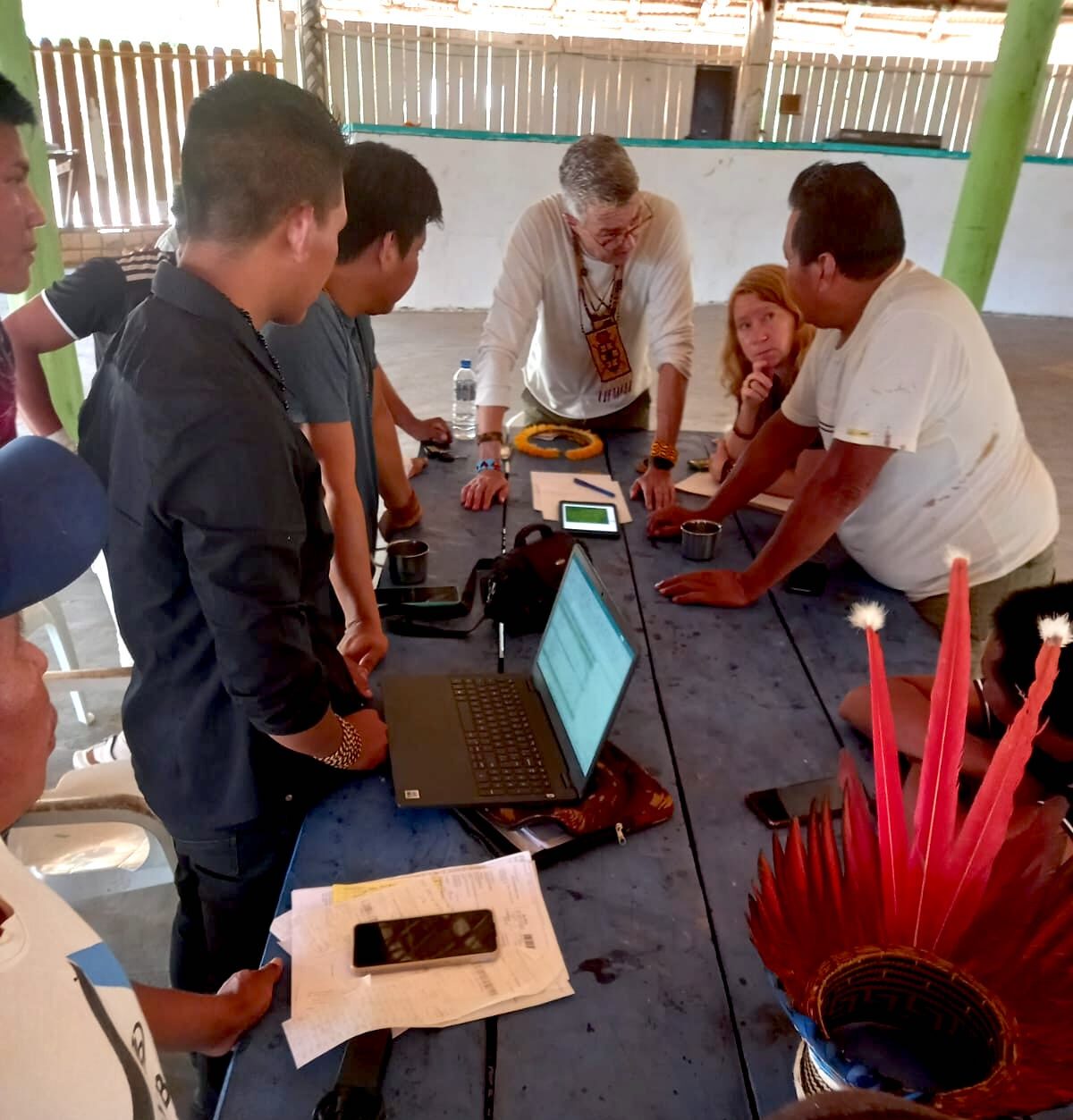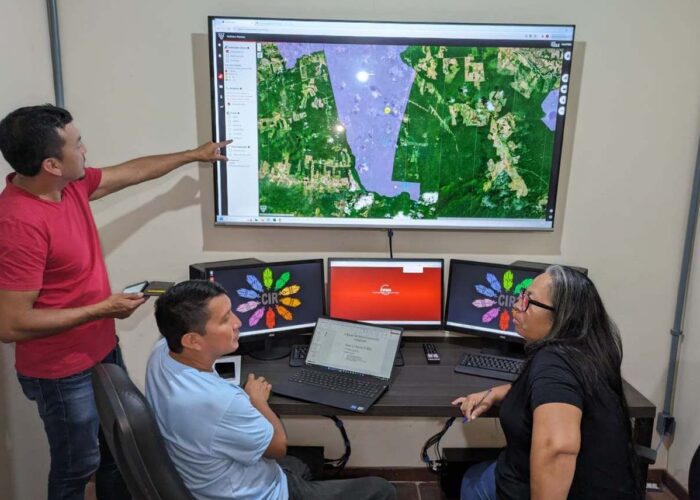- The Indigenous Council of Roraima’s (CIR) annual assembly brought together Indigenous leaders and allied organizations to discuss key decisions around the impacts of climate change and other important topics.
- RFUS’s visit to Brazil aimed to strengthen ties with partners in Roraima, like CIR, Hutukara – Yanomami Association, Seduume, and Wai-Wai organizations.
- RFUS has expanded its programming in Brazil, focusing on territorial defense, Indigenous governance, and territorial control through community-led forest patrolling.
The 53rd General Assembly of the Indigenous peoples of Roraima gathered in Surumu village on the Raposa Serra do Sol Indigenous Territory in March for a memorable meeting. This assembly marked a vital moment for the Indigenous communities of Roraima in northern Brazil. It brought together approximately one thousand people, including Indigenous leaders, allies, and guests from partner organizations such as Rainforest Foundation US (RFUS), the Norwegian Embassy, and the United States Agency for International Development (USAID).
This year’s four-day assembly—themed “Indigenous Peoples’ Land, Identity, and Autonomy”—was organized and hosted by the Indigenous Council of Roraima (CIR), a long-standing partner of RFUS. The assembly, which meets annually, plays an instrumental role in determining key decisions and setting the agenda for the year ahead, and it serves as CIR’s ultimate decision-making forum.
This assembly focused on critical discussions on a wide range of topics, including access to education for Indigenous peoples, the benefits of health policies, impacts of the climate crisis on local communities, climate change mitigation efforts, innovative methods for income generation, and the significant roles of women and youth in the management and protection of their territories.
Christine Halvorson and consultant Luciano Padrão, RFUS Program Director and consultant respectively, attended to gauge progress and align RFUS’s efforts with the Council’s priorities.

“This assembly is a testament to the resilience and unity of Indigenous communities in facing environmental and social challenges. It was an opportunity for RFUS to listen, learn, and align our support with the organization’s priorities and needs, reinforcing our commitment to their rights and the protection of their lands.” – Christine Halvorson, RFUS Program Director.
Environment and Climate Change Minister, Marina Silva, and President of the National Indigenous Peoples Foundation, Joenia Wapichana, both attended. During the event, they received a letter from Indigenous leadership. The letter outlined a number of demands and concerns from local communities, including concerns about the climate crisis and its impacts on their territories, noting an increase in the number and severity of droughts and forest fires.
Local leaders also called for stronger engagement with Indigenous peoples and organizations during the design and development of climate policies, including discussions on carbon market regulation and REDD+ (Reducing Emissions from Deforestation and Forest Degradation), and complying with their rights to Free, Prior, and Informed Consent (FPIC) consultation.
Highlighting the dire consequences of climate change, César da Silva, coordinator for the Serra da Lua region, shared distressing accounts of water shortages and forest fires damaging crops and production. According to Jailda Teixeira, the Barata community’s women’s coordinator, the situation has forced communities to ration water, a challenge compounded by the loss of essential crops such as cassava and bananas.
To mitigate these challenges, CIR’s Deputy Coordinator Enock Taurepang announced the creation of an Indigenous fund to support families and communities. Additionally, the CIR Department for Territorial and Environmental Management introduced a firefighting strategy with 64 firefighters and 120 territorial and environmental agents, who are supporting the development of management plans and climate change case studies.
This assembly symbolizes a crucial step towards addressing the pressing challenges Indigenous peoples face in Roraima. As one of Brazil’s largest and strongest Indigenous organizations, CIR represents 270 communities living in 35 Indigenous lands spread over 24.7 million acres (larger than the state of Indiana). The 55,000 residents include members of the Macuxi, Wapichana, Ingarikó, Patamona, Sapará, Taurepang, Wai-Wai, Yanomami, Yekuana, and Pirititi peoples.
RFUS and CIR’s partnership stretches back more than 20 years and was particularly effective during the demarcation of Raposa Serra do Sol Indigenous Territory in 2005, a landmark victory for Indigenous peoples’ land rights in Brazil’s Amazon region. RFUS supported CIR with legal assistance and public campaigns, contributing to the successful ratification of this 4.2 million-acre territory in Roraima.
RFUS’s Continued Work in Brazil

Beyond the assembly, RFUS’s visit to Brazil aimed to strengthen ties with key partners in Roraima, including CIR, Hutukara Yanomami Association, Wanasseduume Ye’kwana Association (Seduume), and two Wai-Wai organizations. These discussions focused on setting annual priorities, reviewing activities, and planning for the future.
Christine also traveled to an area in southern Roraima along the Guyanese border, a region threatened by deforestation and fires. While there, she visited the community of Xaary in the Wai-Wai territory to meet its leaders and members to discuss plans to combine community forest patrolling and strengthen their organizational governance and administration.
RFUS’s Strategic Focus on Brazil
In 2023, RFUS expanded its programming in Brazil. These plans focused on the Indigenous territories in the northern state of Roraima, and the Xingu Indigenous Territory in the state of Mato Grosso, home to 16 Indigenous peoples. Last year, with partners in Roraima, RFUS enhanced its focus on community forest patrolling and building robust organizational structures.
In the Xingu, with the Instituto Socioambiental-ISA, the Xingu Indigenous Association (ATIX), and the Xingu+ Network, RFUS will support them in implementing their FPIC protocol in light of two major rail and road projects that would impact their lands.
Plans for 2024 include broadening efforts in Roraima and exploring new initiatives in the Xingu basin and elsewhere. RFUS aims to combine support for larger regional organizations and smaller organizations so that together, they will be poised for growth and can tap into direct funding, they will be poised for growth and can tap into increased direct funding.
“These projects are directly aligned with RFUS’s 2024 strategic priorities by focusing on territorial defense—not primarily through titling, but by defending already titled territories. Supporting partners in their efforts against the Marco Temporal trial and illegal mining aligns with our commitment to safeguard Indigenous peoples’ rights to their lands. Additionally, we’re enhancing Indigenous governance and territorial control by incorporating community forest patrolling with the CIR, Seduume, and Wai-Wai associations. This effort not only protects forests but also strengthens community and organizational capabilities to manage financial resources, ensuring the sustainability of their land management strategies. Collectively, these actions embody our strategic commitment to land rights, environmental protection, and institutional strengthening,” explained Christine.








